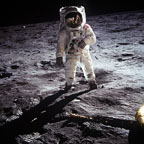Space is awesome. It’s awesome, not in the colloquial sense that it is nice- it is- but it also leaves most humans in a slack jawed state at least once in their life. It truly inspires awe.
The question is, why have we left space alone(National Aeronautics and Space Administration(NASA), has had huge cuts,the war in Afghanistan costs 10.7 million per hour while $17.460 billion is all NASA asked for this year)? Why have we left mans common heritage on it’s own? Who thought it was a good idea to stop focusing on the one concept that inspired millions of people to study science and math, leading to some of the biggest innovations in humanity ranging from consumer electronics to medication? Why have we left the greatest challenge and last frontier of human exploration unexplored?
Money? Fear of what we might find? Laziness? A technological wall? Have we lost our dreams of space? None of these are good answers, and we shouldn’t accept them. Space exploration is far too important to pass up.
Money shouldn’t be an object as space exploration has wide amounts of economic benefits. As space grants the economy jobs, does research (everything from nonstick pans to food dehydration have been done in relation to space travel) and inspires people to study math and science-something the US economy needs to fill the shortage of capable math and science experts. In the most basic terms space travel is good for the economy.
The argument that we should fear of what we might find is simply put ridiculous. If humans did not explore the world, then we would not be here in North America. If we did not explore the world then we would have never found all kinds of cultures, medical treatment, knowledge and people that we have today. Imagine what we could gain by mixing a new planet into our society. Even if we were to find a threat, we can find a way to make it positive, not to say that war is a good thing. There is a quote by Ronald Reagan-a man who I don’t always agree with but did, in this case, speak the truth “…Perhaps we need some outside, universal threat to make us recognize this common bond. I occasionally think how quickly our differences worldwide would vanish if we were facing an alien threat from outside this world” when addressing the United Nations in 1987.
I’m not going to dignify laziness with an answer; if this is truly what is holding us back, and I hope it isn’t, then we as humans have a deep problem.
A technological wall isn’t an issue. We sent a man to the moon with less technology than it takes for me to order pizza or watch cat videos. The amount of technology in it takes to launch a spaceship in a videogame is more than it took to conduct early space flights. The word processor I wrote this column on required more processing power than the Apollo guidance system. If, for some strange reason, we are not up to snuff when it comes to technology, go to a group of engineers and yell “SPACE”: you now have a group to work with, because I don’t know anyone of them who wouldn’t give their left ear to work for NASA. We have the infrastructure to engineer large amounts of technology, but we likely do not need to do so.
The last possibility is the most disturbing, but I think the least likely. I doubt that humans have lost our dreams of space exploration. We are still hungry to expand; we still want to know what lies in the great unknown. Space is still mankind’s common heritage. Looking more towards the US, there is not a lot that anyone can agree about this place, other than that we are good at putting things on the moon without crashing them.
We can reach Mars and beyond if we are willing to go for it. I think the people want it. It’s up to us to vote for leaders who will focus on space travel. It’s up to the world to protect space as the common heritage of mankind. It’s up to us to find private space travel when appropriate and fund public space travel when it’s not.
We know why and we know how. Now we need to go back to space.


